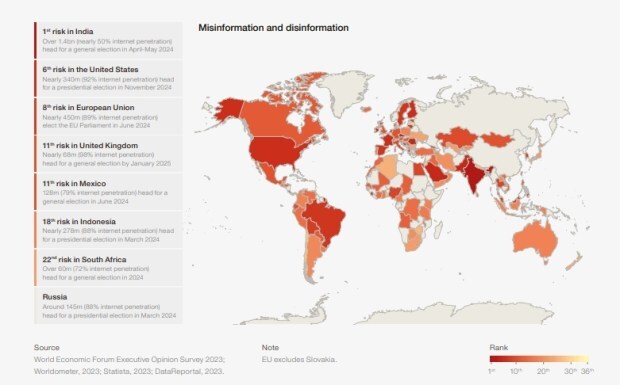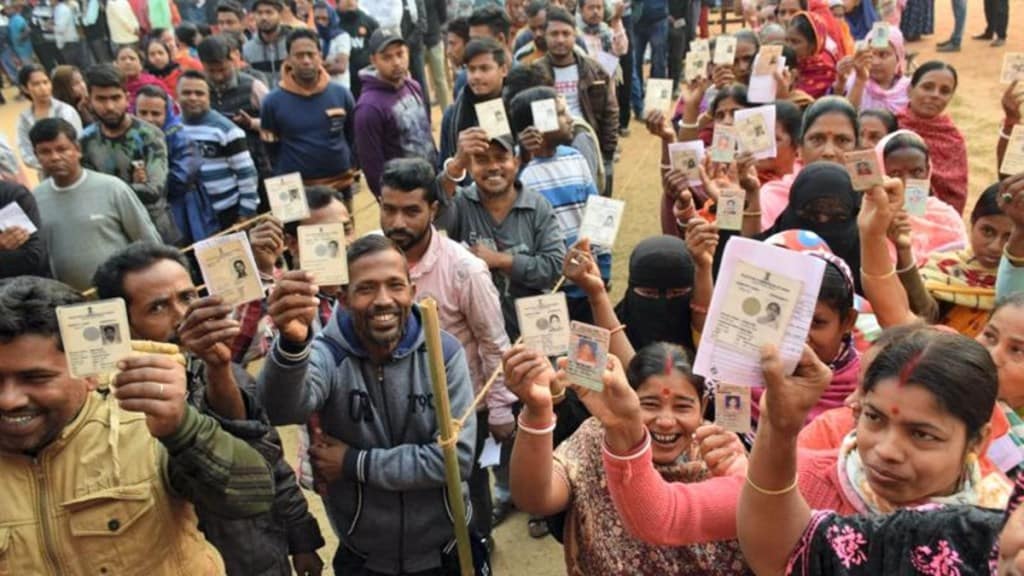At a time when India is headed towards general elections scheduled in April-May this year, a survey by the World Economic Forum (WEF) found that India ranks first in facing the highest risk of misinformation and disinformation in the world.
The ‘Global Risks Report 2024‘ that was released early this year explored some of the “severe risks” that the world faces over the next decade, in the backdrop of “rapid technological change, economic uncertainty, a warming planet and conflict”.
The report defines misinformation and disinformation as persistent false information (deliberate or otherwise) widely spread through media networks, shifting public opinion in a significant way towards distrust in facts and authority. Includes, but is not limited to: false, imposter, manipulated and fabricated content.

The report said that the United States is at the sixth-highest risk of mis/disinformation, the European Union ranks eighth, United Kingdom and Mexico are in the 11th position. South Africa, which is also scheduled to go for general elections, ranks 22nd. The findings were based on 1,490 expert opinions across academia, business, government and international community and civil society that were collected over a period of September 4-October 9, 2023.
“As close to three billion people are expected to head to the electoral polls across several economies – including Bangladesh, India, Indonesia, Mexico, Pakistan, the United Kingdom and the United States – over the next two years, the widespread use of misinformation and disinformation, and tools to disseminate it, may undermine the legitimacy of newly elected governments. Resulting unrest could range from violent protests and hate crimes to civil confrontation and terrorism,” the report said.
“Beyond elections, perceptions of reality are likely to also become more polarized, infiltrating the public discourse on issues ranging from public health to social justice. However, as truth is undermined, the risk of domestic propaganda and censorship will also rise in turn. In response to mis- and disinformation, governments could be increasingly empowered to control information based on what they determine to be “true”,” it further said.
Disinformation will also be increasingly personalized to its recipients and targeted to specific groups, such as minority communities, as well as disseminated through more opaque messaging platforms such as WhatsApp or WeChat, the report said.
Misinformation and disinformation has risen rapidly in rankings to first place for the two-year time frame, and the risk is likely to become more acute as elections in several economies take place this year. Societal polarization, alongside economic downturn, is seen as one of the most central risks in the interconnected “risks network”.
Among the top risks faced by the world, two-thirds of the respondents or 66 per cent voted for extreme weather, AI-generated misinformation and disinformation (53 per cent) and societal and/or political polarization (46 per cent) follow in second and third place.
It said that “cost-of-living crisis” (42 per cent), “cyber attacks” (39 per cent), “economic downturn”, “disrupted supply chains for critical goods and resources” are also among the risks that the world faces in 2024.


